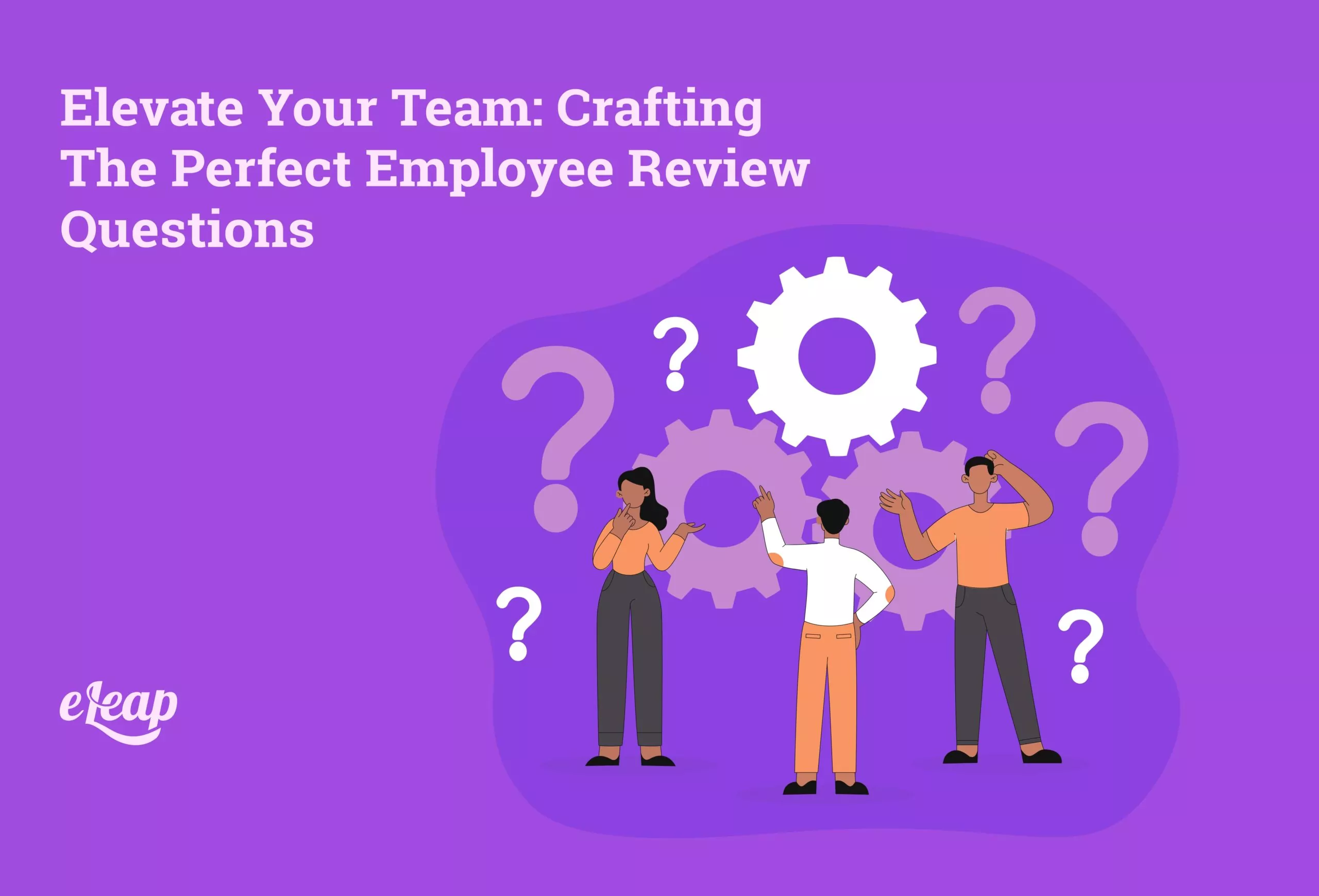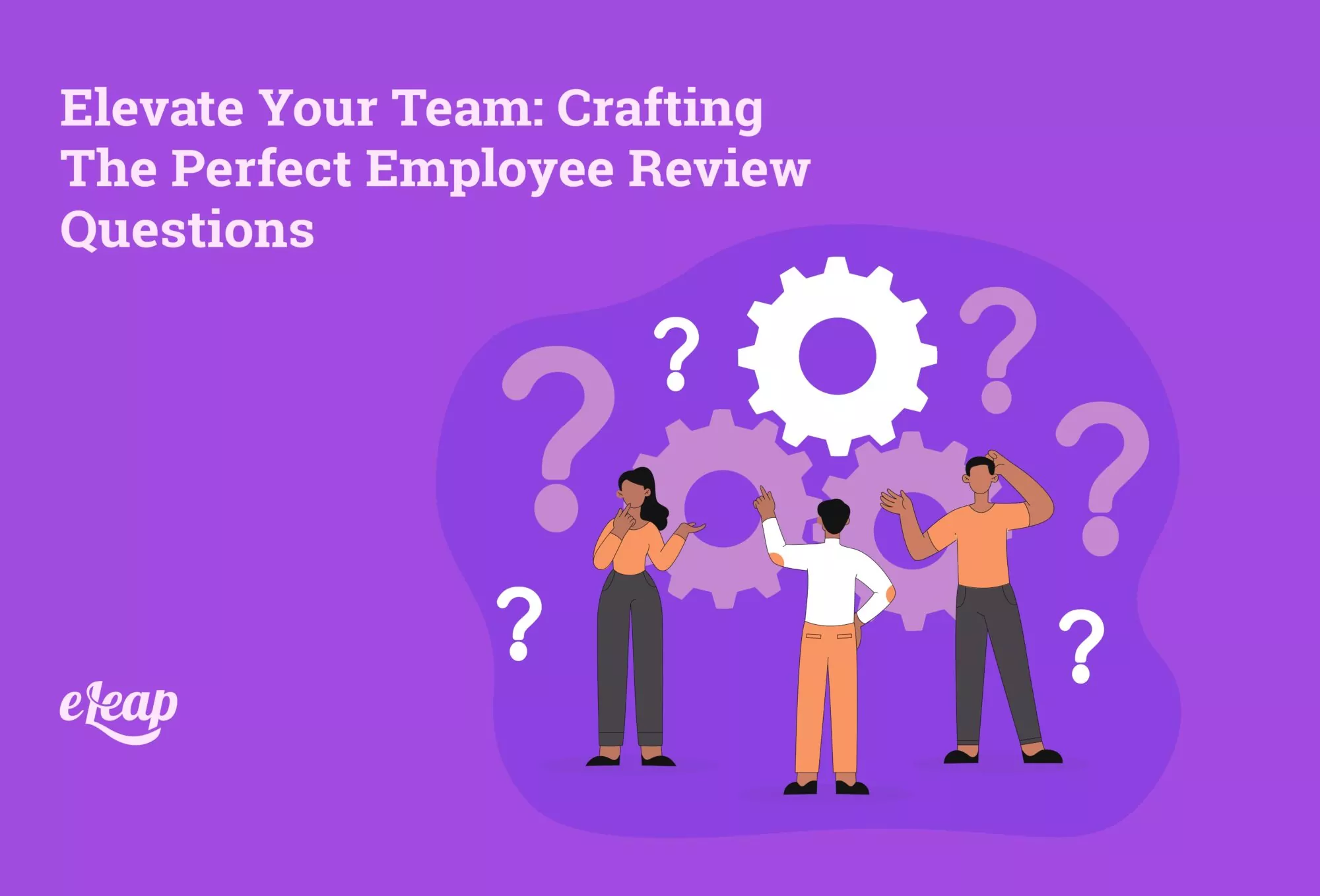Elevate Your Team: Crafting the Perfect Employee Review Questions

The Employee reviews questions are a cornerstone of effective team management. They provide a formal opportunity to assess individual performance, identify growth areas, and set clear goals for the future. However, the success of these reviews hinges mainly on the quality of the questions asked. Crafting the perfect employee review questions is an art that can make or break the entire process. Well-thought-out questions promote honest dialogue and foster professional growth, boosting individual and organizational performance. Explore how eLeaP®’s Performance Management Platform can simplify evaluations, boost productivity, and drive measurable results.
This article will explore how to create impactful employee review questions that help guide meaningful feedback, promote employee development, and ultimately elevate your team. Let’s dive into the key strategies to ensure your employee review process drives results.
Introduction to Employee Review Questions
Before diving into the specifics of crafting employee review questions, it’s essential to understand their importance. Employee reviews are a vital tool in any business, helping managers track performance, recognize achievements, and identify areas for improvement. However, the right questions significantly affect how productive and insightful these reviews can be.
Framing questions determine whether the review is a simple evaluation or sparks a valuable conversation that drives progress. This stage is why carefully chosen employee review questions are necessary for creating an environment of growth, trust, and continuous improvement. Asking the right questions can also enhance employee engagement, making employees feel valued and heard, ultimately improving morale and productivity.
The Power of Well-Crafted Performance Review Questions

Performance reviews can serve as a transformative tool when appropriately structured. When people ask the wrong questions or focus on the bad aspects, the evaluation shifts from a meaningful exercise to a mere formality. Questions should go beyond simply assessing past performance. They must encourage employees to reflect on their growth, areas where they struggled, and what they need to achieve to move forward.
Good performance review questions can highlight key performance indicators (KPIs), but more importantly, they give insight into an employee’s mindset and potential. Managers can use these insights to coach employees, aligning them with the broader organizational goals and helping them reach their full potential.
Why Employee Feedback Matters in Performance Reviews
Feedback is at the core of any effective performance review. It helps employees understand their strengths and areas for improvement. Without feedback, employees would have little direction on how to grow within their roles or improve their contributions to the team. Constructive feedback can act as a blueprint for future success, allowing employees to align their personal goals with company expectations.
Fostering a Growth-Oriented Mindset
When employee feedback is framed positively, it encourages a growth mindset. Instead of focusing solely on shortcomings, a growth-oriented mindset helps employees understand that development is continuous. Employees are more likely to adopt strategies to overcome challenges when given specific feedback on improvement areas.
Employees who view feedback as a tool for growth are more likely to take ownership of their development. Instead of viewing their mistakes as failures, they see them as opportunities to learn and improve.
Strengthening Employee-Manager Relationships
Employee feedback also plays a crucial role in building stronger employee-manager relationships. Feedback creates an ongoing dialogue, allowing managers to understand what their employees need personally and professionally. By regularly engaging in feedback discussions, managers can create an environment of trust and openness.
This process increases job satisfaction, as employees are more likely to feel heard and supported in their roles. When employees see that their managers genuinely care about their development, they are likelier to remain loyal and engaged, leading to lower turnover rates.
Essential Types of Employee Review Questions
There is no one-size-fits-all when it comes to employee review questions. Tailor the questions asked during the review to the individual’s role, experience, and goals. The right balance of question types can comprehensively understand an employee’s performance and potential.
Behavioral Questions: Reflecting on Past Performance
Behavioral questions are designed to encourage employees to reflect on their past actions and decisions. These questions help evaluate how an employee has handled situations in the past, providing valuable insight into how they might perform in similar situations in the future.
For example, asking an employee, “Can you describe a time when you successfully handled a challenging situation at work?” allows the employee to showcase their problem-solving skills and ability to adapt to difficult circumstances. This question also helps managers assess whether the employee’s responses align with company values and culture.
Developmental Questions: Fostering Growth
Developmental questions aim to understand how an employee wants to grow. They provide employees with the opportunity to share their aspirations and areas for improvement.
A question like, “What skills would you like to develop over the next year?” allows employees to reflect on their professional goals and gives managers the insight to provide relevant training or mentorship. This conversation helps create an actionable plan for skill-building, ensuring employees have the support they need to succeed.
Future-Oriented Questions: Aligning Goals and Expectations
Future-oriented questions focus on aligning the employee’s career trajectory with the company’s goals. Asking questions such as, “Where do you see yourself in 12 months, and what steps can we take together to make that happen?” allows employees to think ahead, set clear professional goals, and collaborate with managers on how to achieve them.
By helping employees create a roadmap for their career growth, companies can drive retention and engagement, knowing that employees have a clear vision of their future and feel supported in achieving it.
Goal-Setting Questions: Creating Clear, Measurable Targets
Setting clear, measurable goals is one of the most effective ways to assess performance. Goal-setting questions help employees focus on key objectives and provide a benchmark for measuring their success. For instance, asking, “What specific milestones do you hope to achieve by the end of the next quarter?” helps employees break down their goals into actionable steps. These milestones provide tangible targets, which managers can later assess to determine whether expectations are met.
Open-Ended Questions: Encouraging Reflection
Open-ended questions are essential for giving employees the space to express themselves. They encourage dialogue, allowing employees to share feedback, thoughts, and suggestions that might not be captured through more structured questions.
For example, asking, “What challenges have you faced this year, and how did you overcome them?” allows employees to reflect on their accomplishments and opens the door to a deeper conversation about obstacles, personal growth, and strategies for future success.
Structuring the Employee Review Conversation
Effective employee reviews are about more than just asking the right questions—they also require a structured conversation. Managers can ensure the review is productive and focused by managing the review flow and setting clear expectations beforehand.
Preparing for a Successful Review: Setting Expectations
Setting expectations before the review begins is essential for creating a positive experience. The manager and the employee should be clear about the purpose of the evaluation and the goals they hope to achieve. Preparing in advance also allows employees to come to the meeting clearly, understanding what will be discussed and how they will be evaluated.
Navigating the Flow: From Feedback to Actionable Insights
The review conversation should flow naturally from feedback to action. After giving feedback, guiding the discussion towards practical next steps is essential. Managers should ask employees for their thoughts on addressing any areas for improvement and work together to create a development plan. The review should identify areas for growth and provide employees with the tools and resources they need to improve.
Crafting a Roadmap: Setting Clear Action Plans Post-Review
A successful employee review should result in a clear action plan. This stage includes setting new goals, discussing resources or training opportunities, and scheduling follow-up meetings to assess progress. A review without follow-up is ineffective, as it misses the opportunity to ensure that the feedback and discussions have led to real change. Creating an actionable roadmap allows the employee and manager to track progress and revisit goals regularly.
Best Practices for Conducting Impactful Performance Reviews
Following some best practices is crucial to maximizing your performance reviews. These practices help ensure the process is valuable for managers and employees, resulting in actionable insights and improvements.
Tailor Your Questions to Fit the Role and Career Stage
Tailor the questions to fit the employee’s role and career stage during a performance review. For example, leadership-focused questions are appropriate for managers or senior staff, while entry-level employees may benefit from skill development and adaptability questions. Understanding the individual’s role allows managers to ask more relevant and insightful questions, creating a more meaningful conversation.
Incorporate Data and Metrics into Your Review Questions
Using data in the review process makes feedback more objective and focused. Employees often feel more motivated to improve when concrete metrics support the input. For example, instead of saying, “You need to improve your productivity,” a more data-driven question could be, “Your output over the last quarter was 20% below target; what strategies can we implement to help you meet your goals moving forward?”
Focus on Solutions: Driving Development Beyond Criticism
While identifying areas for improvement is essential, focusing on solutions is equally crucial. A performance review highlighting what needs to change without offering guidance or solutions can demoralize employees. Focusing on development means turning weaknesses into areas for growth, offering resources, mentorship, and time for employees to develop their skills.
Examples of Effective Employee Review Questions for Different Roles
Customize performance reviews based on the employee’s role. Different roles require you to ask different questions to assess performance effectively.
Sales Team Review Questions
For sales employees, performance reviews often focus on sales targets, customer interactions, and relationship-building metrics. Questions like, “What strategies helped you achieve your sales targets this quarter?” allow employees to reflect on their successes and identify areas for improvement.
Leadership Review Questions
Leadership performance reviews should focus on team management, decision-making, and strategic thinking. Questions like “How have you ensured your team remains motivated during challenging times?” help evaluate leadership effectiveness and identify potential areas for development.
Entry-Level and Junior Staff Review Questions
For entry-level employees, performance reviews focus on skill development, adaptability, and growth potential. Asking questions like, “What challenges have you encountered in your role, and how have you addressed them?” allows employees to reflect on their growth and identify areas where they need additional support or training.
Cross-Functional Team Members: Assessing Collaboration and Impact
Cross-functional team members often work across departments, and their performance reviews should assess communication, collaboration, and impact on company goals. Questions like, “How do you ensure smooth collaboration with different teams?” help assess employees’ ability to work well in diverse environments.
Conclusion
Crafting the perfect employee review questions goes far beyond asking about past performance. It’s about fostering growth, creating a roadmap for development, and setting employees up for success in the future. A well-structured review process can lead to higher employee engagement, stronger team dynamics, and better company performance.
By focusing on thoughtful, actionable questions, creating an open dialogue, and focusing on development, you ensure that employee reviews are not just a routine task but a meaningful tool for long-term growth. Whether using a platform like eLeaP to streamline your review process or conducting reviews manually, the key to success is how you engage with employees during the review.